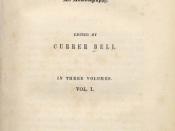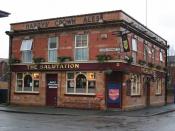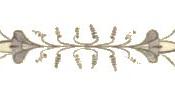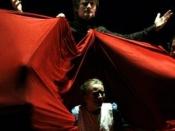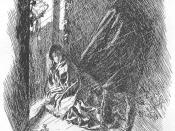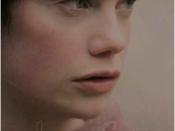As one era ends another begins. Old eras are remembered and not forgotten for they are a symbol of our past mistakes; a template to learn from. As we see in today's world, equality is the key. This has evolved from the past where not everyone was treated as an equal. Race, sex and money decided your rights. Charlotte Bronte tells us the story of a woman; A woman who throughout her life has struggled to stand upon the same stage as men. The book Jane Eyre is a narrative based on Jane Eyre's life and her struggles as a woman in the Victorian era. The novel gives today's feminists a gala event as it explores how Jane Eyre, like other women of the era, are looked down upon as inferiors and repressed by the society they live in.
Jane experienced inferiority early in her life. As an orphan, having lost both her parents, she lives with her aunt and cousins - John, Eliza and Georgiana Reed.
As John is of the bullying nature, he picks on Jane and strikes her on the head. Jane fights back to defend herself. At this point her aunt walks in and christens Jane as the culprit. We are witness to the first act of injustice upon Jane. " My head still ached and bled with the blow ad fall I had received; no one had reproved John for wantonly striking me; and because I had turned against him to avert farther irrational violence, I was loaded with general opprobrium" (Bronte 17). The quote stated above is a sample of the fight between Jane and John and the consequences for Jane. Although John was at fault, Jane suffered the discipline. Since Jane is a girl, it is not expected of her to get into fights. As a girl, she is to be pretty, quite, obedient and picture perfect in her pink dress. This scene introduces to the reader the mold that each and every female must sculpt herself to fit. As we can see, Jane is not one to be bullied and pushed over easily. She is capable of defending herself when push comes to shove. She does not think of the consequences of the fight. All that passes through her head is that John is "â¦a tyrant: a murdererâ¦" (Bronte 13) and her defense mechanism kicks in. She will not stand for injustice even if the consequence is her looking less lady-like. This goes against what the Victorian era society believes.
Even as an adult, Jane suffers from suppression. As she grows into a woman, she travels down many paths. One path leads her to St. John Rivers, who wishes to wed Jane. Knowing St. John River's nature and her own, Jane knows that a marriage to John would mean for her to be left in his shadow. "â¦forced to keep the fire of my nature continually low, to compel it to burn inwardly and never utter a cry, though the imprisoned flame consumed vital after vitalâ¦" (Bronte 420). As a wife Jane is reminded of her inferiority to her husband, whether it's Mr. Rochester or St. John Rivers. With Mr. Rochester, it was not only her being a woman that made her inferior, but also her social class. To emphasize on this, Mr. Rochester "â¦tries to dress her in jewels and a diamond which makes her feel as if a mistress not a wifeâ¦" (Bronte 227). Mr. Rochester treats her as an object which harbors no real feelings, no opinions and no beliefs. She is expected to be an empty yet wonderful box. St. John is no better. As mentioned earlier, Jane married to St. John would be living in his shadow. The independent woman would be replaced by St. John's wife with no identity of her own, as she would have to follow his dreams and agenda, while disregarding her own wishes.
The book not only shows women's inferiority during the Victorian era through events that take place in Jane's life, but also portrays the injustice through Jane's thoughts. Throughout the novel we are given glimpses into Jane Eyre's mind showing us the strength of the woman. There are several times when Jane speculates about how women are treated compared to men and how unjust it is for society to work in such a way. "Women are supposed to be very calm generally; but women feel just as men feel; they need exercise for their faculties, and a field for their efforts as much as their brothers do; they suffer from too rigid a constraint, to absolute a stagnation, precisely as men would suffer; and it is narrowed-minded in their more privileged fellow-creatures to say that they ought to confine themselves to making puddings and knitting stockings, and playing piano and embroidering bags. It is thoughtless to condemn them, or laugh at them, if they seek to do more or learn more than custom has pronounced necessary for their sex" (Bronte 112 -113). The quote above is an excellent example of Jane wondering why women are expected to have a heart of wax. Why is it that women must smother and stifle their wants and needs? Why is that women are to portray no emotions. Are they not just as much human as men? The Victorian era was full of many restrictions with no reasoning. As we see through out the book, constriction of women is common. Every woman is expected to be seen a certain and is expected to behave a certain way. Education and money are not so readily available for women. They do not have the same leisure, freedom and independence at their disposal as we have today.
The theme of feminism is evident and steady within the novel. Jane Eyre is constantly barraged with situations where she is left feeling inferior to men. She fails to see how inequality can be a part of society. Jane does not understand the monotone and closed box thinking of the era she lives in. She does not see the reasoning behind the "rules" that are listed out for women making them second to men, and so she does feel the necessity to comply with society's image of women. She is a free-spirited, independent woman with an identity of her own. Her freedom loving character arises to each and every situation which attempts to knock her down a few levels. She faces each of her circumstances and predicaments with unwavering bravery, strength and structure. She evolves from a girl to a woman, from an orphan to a teacher to a wife through out the novel and yet her principles remain intact, dominant and influential as any man.
BIBLIOGRAPHY:â¢Bronte, Charlotte. Jane Eyre. London, NY: Penguin Books USA Inc, 1982. 9-461.
â¢"Jane Eyre." Sparks notes. Sparks notes LLC. 28 Nov. 2008 .
